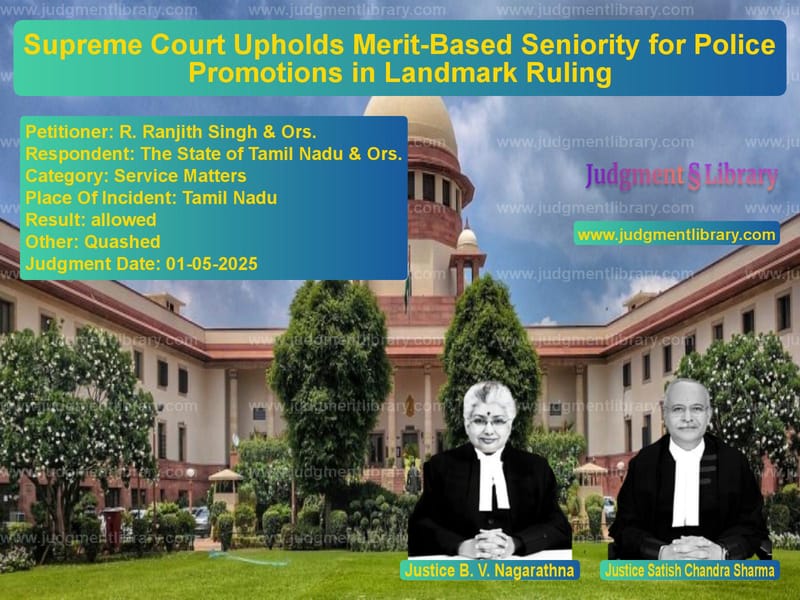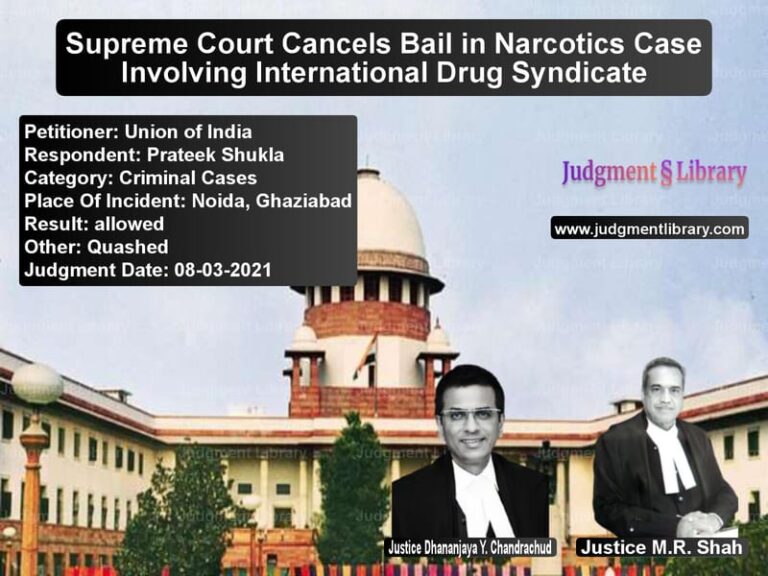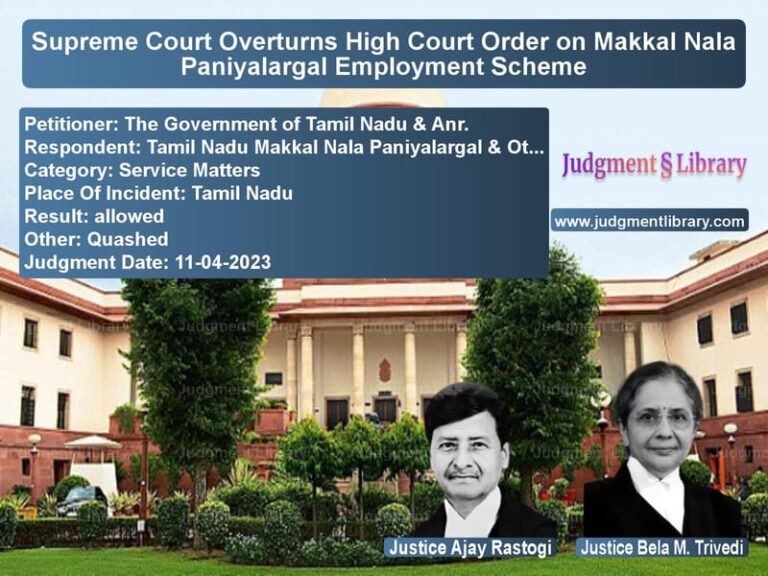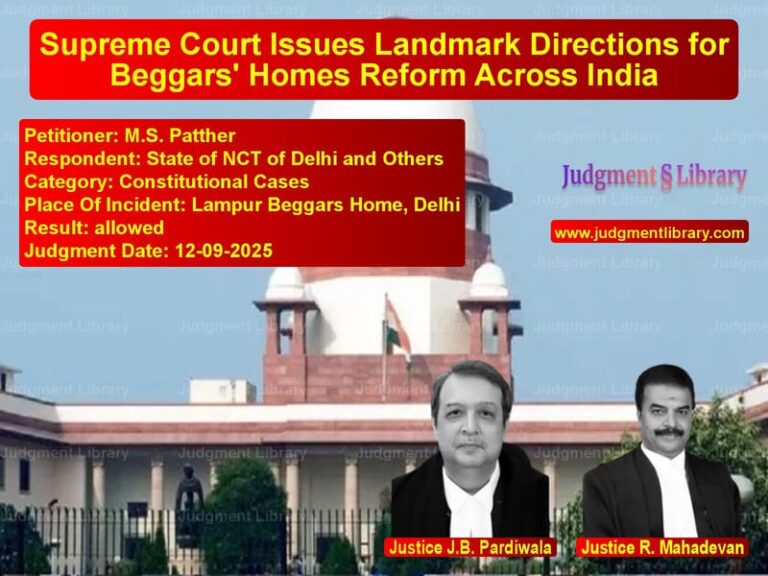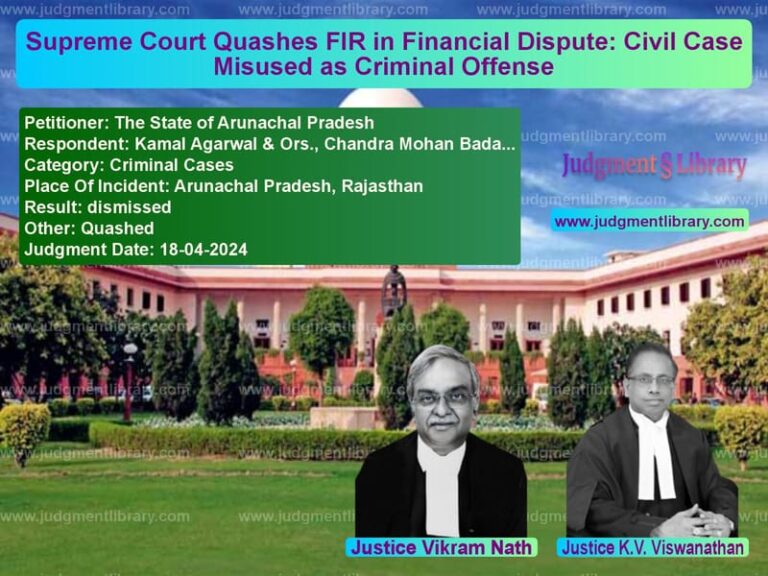Supreme Court Upholds Merit-Based Seniority for Police Promotions in Landmark Ruling
In a landmark judgment that reinforces the principle of meritocracy in public service, the Supreme Court of India has delivered a decisive verdict on the contentious issue of seniority among police officers in Tamil Nadu. The case, which spanned nearly three decades, involved a complex dispute between directly recruited Sub-Inspectors and their counterparts who were promoted from within the police constabulary through a special quota system.
The controversy began in 1995 when the Tamil Nadu government introduced a policy reserving 20% of direct recruitment vacancies for serving police constables and head constables. While this initiative was intended to provide career advancement opportunities for experienced personnel, it created an unexpected problem: the government also decided that these in-service candidates would be given seniority over directly recruited candidates, regardless of their performance in the selection examination.
The Legal Battle Over Seniority
The appellants, led by R. Ranjith Singh, challenged this seniority policy before the Madras High Court, arguing that it violated fundamental principles of fairness and merit. They presented compelling evidence showing how meritorious candidates were being superseded by less qualified ones. For instance, Ranjith Singh had secured 79.10 marks and was the first rank holder, while a departmental candidate named Santhakumari had secured only 69.27 marks. Yet, under the government’s policy, Santhakumari was placed above Ranjith Singh in the seniority list.
The appellants’ senior counsel argued vehemently before the Supreme Court that “under the 1955 Rules, there are already three modes of recruitment, which are (i) by transfer to the services; (ii) by promotion; and (iii) by direct recruitment. So far as direct recruitment is concerned, the seniority of all direct recruitees has to be fixed based upon the marks obtained by them in the qualifying examination and preferential treatment cannot be given to candidates who are in-service candidates.”
He further contended that “once the recruitment is from the open market i.e. direct recruitment, merely because a person has worked in the Department earlier, such person cannot steal a march over direct recruitees even though he is lower in merit.” The counsel emphasized that the amendments brought through government orders were “violative of Articles 14, 16 and 21 of the Constitution of India” and deserved to be struck down.
The State Government’s Defense
The State Government defended its policy, arguing that in-service candidates deserved preferential treatment due to their experience and service tenure. They contended that “the Government, in their wisdom, have thought it fit to give preference to the in-service candidates who have already put in five years of experience prior to their recruitment to the post of Sub-Inspector under the 20% quota out of 100% earmarked for direct recruitment and the same was done as in-service candidates were having experience, they are aged and in order to provide channel of promotion to them before their retirement.”
Read also: https://judgmentlibrary.com/supreme-court-upholds-teachers-appointment-in-caste-category-dispute/
The government also raised practical concerns, noting that many in-service candidates had already received further promotions based on the existing seniority lists, and changing these lists would cause significant disruption and potential reversions.
The High Court’s Controversial Decision
The Madras High Court had upheld the government’s policy, reasoning that “in-service candidates have to be given preference especially when they have already earned hands-on experience in the department and had learnt the nuances in the police department. Such experience gained by them would certainly overweight against the 600 candidates appointed along with them.”
The High Court further observed that “if such a preference is not given to the in-service candidates, at least for determining their seniority, it would frustrate them as they have taken the mantle much ahead of the 600 directly recruited candidates.”
The Supreme Court’s Landmark Ruling
The Supreme Court, comprising Justices B.V. Nagarathna and Satish Chandra Sharma, delivered a comprehensive judgment that fundamentally reshaped the understanding of seniority in direct recruitment processes. The Court made several crucial observations that struck at the heart of the government’s policy.
The Court noted that “in the considered opinion of this Court, such an action on the part of the Respondent State is against the settled canons of law. In respect of fixation of seniority of direct recruitments, the unamended rule i.e Rule 25 was very clear which provided for fixation of seniority with reference to the rank assigned by the appointing authority in the list of selected candidates.”
Addressing the government’s repeated attempts to implement the policy through executive orders rather than proper statutory amendments, the Court held that “it is a well settled proposition of law that executive instructions cannot supplant the statutory rules. They can supplement/clarify the statutory rules. In the present case, the executive instructions issued from time to time have in fact supplanted the statutory rules and such a process is unheard of in the field of service jurisprudence.”
The Court referenced its earlier judgment in Jaiveer Singh vs. The State of Uttarakhand, emphasizing that “It can thus be seen that it is a trite law that the Government cannot amend or supersede statutory rules by administrative instructions, but if the rules are silent on any particular point, it can fill up the gaps and supplement the rules and issue instructions not inconsistent with the rules already framed. It is a settled proposition of law that an authority cannot issue orders/office memorandum/ executive instructions in contravention of the statutory rules. However, instructions can be issued only to supplement the statutory rules but not to supplant it.”
Constitutional Violations and Merit Principle
The Supreme Court strongly condemned the retrospective application of the seniority rules, stating that “the amendment brought vide G.O. dated 21.11.2017 amending Rule 25(a) of the 1955 Rules, which provides for grant of seniority to all in-service candidates over and above candidates recruited from the open market is certainly violative of Articles 14, 16 and 21 of the Constitution of India and deserves to be struck down by this Court.”
The Court further observed that “the State Government after realizing its mistake has gone to the extent of giving retrospective effect in the matter of seniority meaning thereby giving a preferential treatment to the in-service candidates who are less meritorious and who have already been granted a concession by permitting them to appear under the 20% quota earmarked for them.”
Drawing from its judgment in Dinesh Kumar Gupta vs. High Court of Judicature of Rajasthan, the Court reinforced that “the inter se placement of the candidates selected through LCE must be based on merit and not on the basis of the seniority in the erstwhile cadre.” This principle was deemed equally applicable to the direct recruitment process for police sub-inspectors.
Comprehensive Directions for Implementation
The Supreme Court didn’t just strike down the problematic provisions but also provided detailed directions for implementation. The Court ordered that “the respondents shall recast all gradation list issued from time to time in respect of direct recruitment which includes 20% in-service candidates recruited directly to the post of Sub-Inspector of Police by granting seniority on the basis of marks obtained in the qualifying examination/selection process.”
Recognizing the practical difficulties, the Court provided that “the respondent State shall not revert any officer who has been given further promotion on the basis of the seniority list already issued by the Department from 1995” but mandated that “after issuance of revised seniority list, the State Government shall consider the cases of all departmental candidates for promotion to the next higher post keeping in view the promotions granted to the juniors.”
The Court also directed that “the direct recruits, in case they are found fit for promotion to the next higher post will be entitled for notional promotion, fixation of seniority and all other consequential benefits except back wages on grant of promotion to the next higher post.”
Looking forward, the Court mandated that “the State Government shall hereinafter conduct one common examination for 100% direct recruitment for appointment to the post of Sub-Inspector of Police which includes 80% from open market and 20% from in-service candidates and their seniority shall be assigned based upon the marks obtained by individual candidates/rank assigned by appointing authority in the list of selected candidates.”
Broader Implications
This judgment has far-reaching implications for service jurisprudence in India. It firmly establishes that in direct recruitment processes, merit as demonstrated through competitive examinations must be the primary determinant of seniority. The Court’s strong stance against retrospective amendments that undermine meritocracy sets an important precedent for future cases involving seniority disputes.
The ruling balances the need to provide career advancement opportunities for experienced personnel while maintaining the fundamental principle that in direct recruitment, all candidates must be treated equally based on their performance in the selection process. By allowing the 20% reservation for in-service candidates to continue but insisting on merit-based seniority, the Court has crafted a solution that respects both experience and excellence.
This judgment serves as a powerful reminder that while governments have the authority to frame policies for employee welfare, these policies must conform to constitutional principles of equality and non-discrimination. The Supreme Court’s firm stand on maintaining merit as the cornerstone of public service recruitment reinforces the foundation of an efficient and impartial administration.
Petitioner Name: R. Ranjith Singh & Ors..Respondent Name: The State of Tamil Nadu & Ors..Judgment By: Justice B. V. Nagarathna, Justice Satish Chandra Sharma.Place Of Incident: Tamil Nadu.Judgment Date: 01-05-2025.Result: allowed.
Don’t miss out on the full details! Download the complete judgment in PDF format below and gain valuable insights instantly!
Download Judgment: r.-ranjith-singh-&-o-vs-the-state-of-tamil-n-supreme-court-of-india-judgment-dated-01-05-2025.pdf
Directly Download Judgment: Directly download this Judgment
See all petitions in Promotion Cases
See all petitions in Employment Disputes
See all petitions in Recruitment Policies
See all petitions in Public Sector Employees
See all petitions in Judgment by B.V. Nagarathna
See all petitions in Judgment by Satish Chandra Sharma
See all petitions in allowed
See all petitions in Quashed
See all petitions in supreme court of India judgments May 2025
See all petitions in 2025 judgments
See all posts in Service Matters Category
See all allowed petitions in Service Matters Category
See all Dismissed petitions in Service Matters Category
See all partially allowed petitions in Service Matters Category

